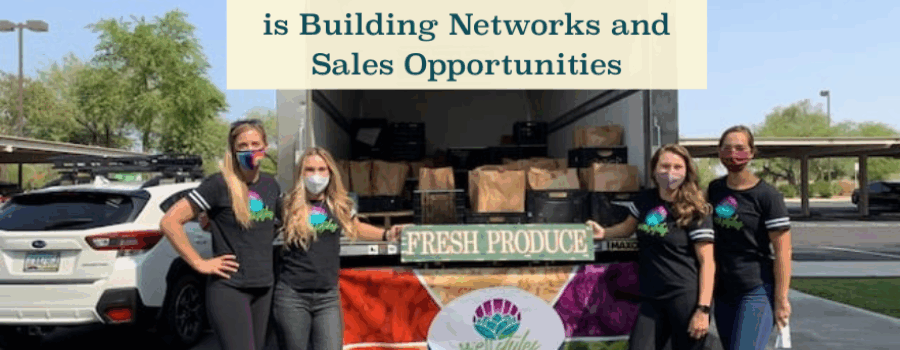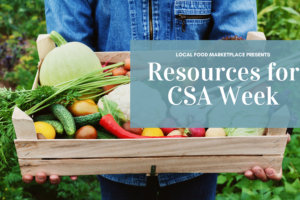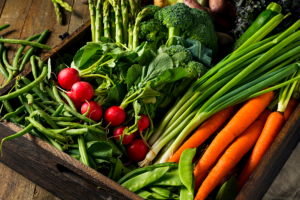Sun Produce Cooperative in Tempe, Arizona, is a multi-stakeholder cooperative founded to help the state’s smaller-scale producers increase sales and preserve their farmland. It aggregates from more than 40 producers and sells their products through wholesale channels and a “farmraiser” farm bag program. Building on its success, it has ambitious plans to increase the sustainability of its farms and get more fresh food into the hands of Arizona residents.
Many of the operating procedures put in place when Sun Produce started needed improvements as the organization grew and diversified. Manager Cindy Gentry and Board Member Dave Brady (who also owns BAR-B Produce) began using Local Food Marketplace’s food hub software in 2022 to manage their wholesale business. It’s been so successful that the organization will begin using the software to run its CSA or “farm bag” program by August 2025.
In this blog post, we share Sun Produce’s inspiring story and outline how managing all of its business on one software platform is saving the food hub time, allowing them to provide better customer service and facilitating creative partnerships as they look to the future.
Education, Partnerships are Key to Food Hub’s Success
Though Sun Produce’s initial aim was to increase farmers’ sales, they have become a trusted partner, providing critical education around subjects like food safety rules and how to pack products for wholesale sales. This has made it possible for more small farms to transact with the food hub’s large buyers, including restaurants, grocery stores, hospitals, and schools.
Belonging to a successful food hub has shown farmers the benefits of working together to create a stronger regional food system.
I used to go to farmers markets, and I would see the other farms as competitors. With as big as the co-op has gotten, we now realize we need each other to fill the orders. We try to work with each other so that if someone has a shortage, other people can step in to fill that order.”
—Dave Brady, Sun Produce
Partnerships are also critical to carrying out Sun Produce’s wide-ranging work in the community. It provides produce to food banks and Activate Food Arizona, which operates a mobile farmers market visiting underserved communities, and is participating in a pilot “food as medicine” program this summer. A relationship with Pivot Produce, another food hub based in Tucson, is working to get local fruits and vegetables into numerous schools around the state.
CSA Program Benefits Community Organizations
When Sun Produce decided to add a CSA or farm bag program, it structured it as a “farmraiser” for schools and other community groups. The partners do much of the work, including marketing the CSA, assembling the bags from produce provided by the food hub, and handing out the bags. In exchange, they get to keep an average of 10% of the total sales.
The idea is that kids are out selling something nutritious instead of candy bars. One school uses the money to do onsite chef demonstrations and tasting experiences and education for the parents and kids in the community. We have a charter school that saves the money and at the end of the year, they use the money to take sixth graders to science camp.”
—Dave Brady
Looking forward, the hub hopes to expand food as medicine programs and introduce salad bars in Arizona schools. It is creating meal kits and lightly prepared products, like bagged coleslaw mixes, to make it easier for people to include local food in quick meal preparation. Sun Produce is also looking to bring several Arizona food hubs into a network so they can work more closely together (keep reading to learn more).
How LFM’s Food Hub Software Helps Sun Produce Work Smarter
All this growth has required Sun Produce to look for ways to increase efficiency and provide better customer service. The food hub recently consolidated its wholesale sales and CSA program into LFM, the market leader in software for food hubs and other local food organizations. Cindy and Dave highlighted several features in LFM that are helping them save time, improve operations, and strengthen their all-important collaborations.
LFM Saves Times, Creates a Professional Appearance
“For the first five years of our existence, we did our whole availability list in Excel,” said Cindy. “Every Thursday, I called every vendor and asked what they had, how much they had, and what to sell it for, and that went into the Excel file.”
With LFM, producers add their own products to Sun Produce’s availability list every week. Cindy estimates this saves her at least six hours a week — time she can put back into supporting farmers and building more partnerships.
Each listing has pictures and a detailed description, so I feel like we have a much more professional look.”
—Cindy Gentry
Buyers love shopping on the site, and Cindy appreciates the way it has streamlined the food hub’s operations. “We don’t oversell things anymore,” she said. “It’s helped get our routes straight and helped drivers understand where to go.”
Quickbook Integration Makes Invoicing Easy
With LFM, it’s a snap to generate invoices and analyze financial data.
It has been very, very helpful to us to have all of the sales information consolidated into one place. Right now, the only thing we do outside of LFM is the accounting, but since LFM interfaces with Quickbooks, that makes it really easy to keep everything in sync.”
—Dave Brady
Food Hub Software Quickly Generate Reports
One of Cindy’s favorite things about LFM is its numerous reporting features. She can quickly pull data for grantors on the number of people served through a particular program, where those people live, and how much food Sun Produce provided.
Farms will call and say, ‘How much of this did I sell because I want to plan for my next season.’ I can get them an answer in a minute.”
—Cindy Gentry
Subscriptions Features Makes Customizable CSA Possible
Sun Produce’s farm bag program offers a set selection of produce items every week, but many customers like to add additional items. With the food hub’s old software, the only way to allow add-ons was to offer every item in the storefront, which led to fulfillment headaches.
Thanks to LFM’s custom list builder feature, Dave can now create a select list of 10 to 15 products customers can add to their weekly farm bag. Dave estimates generating all of these lists takes no more than 15 minutes.
Learn more about the types of customizable CSAs LFM supports in this blog post.
Visit the BlogCreating Closer Connections Between Food Hubs with Local Food Network
Sun Produce has seen the power of partnerships first-hand. That’s why it’s leading the charge to establish a network between several Arizona food hubs using LFM’s Local Food Network solution.
The network will have several benefits. Arizona farms that sell to multiple food hubs currently have to upload their products to each individual site. With a network, farmers can upload their products to one site, and food hubs can populate their site with fruits, vegetables, meat, dairy, prepared products, and anything else they want to offer.
Buyers will still visit their local food hub storefront for anything they need, but they’ll be able to access food from across the state. This will give them access to a wider selection of local food in higher quantities — all while supporting an organization in their community.
In addition, the network will streamline the process food hubs use to purchase products from each other. That will make partnerships like the one between Sun Produce and Pivot Produce easier to manage. “We’re going to solve a lot of issues and make everything much more efficient,” said Dave.
To Cindy, one of the most important things about the AZ Food Hub Network is that it allows food hubs to work together while still maintaining their autonomy.
Everyone has different ways of doing things in different parts of the state. People in their region know best how to operate with the needs of their producers. But, we have things we want to do together.”
—Cindy Gentry
Local Food Network will allow the hubs to work within a common system but run their business in the way that makes sense for their community.
The outlook is bright for Sun Produce and its many farmers and community partners. As it explores new opportunities and continues to build a more sustainable local food system in Arizona, LFM will support them every step of the way.
Are you interested in learning how software from Local Food Marketplace or Local Food Network can bring these and other benefits to your food hub? Schedule a one-on-one demo with our team today!





Leave a Reply
Your email is safe with us.